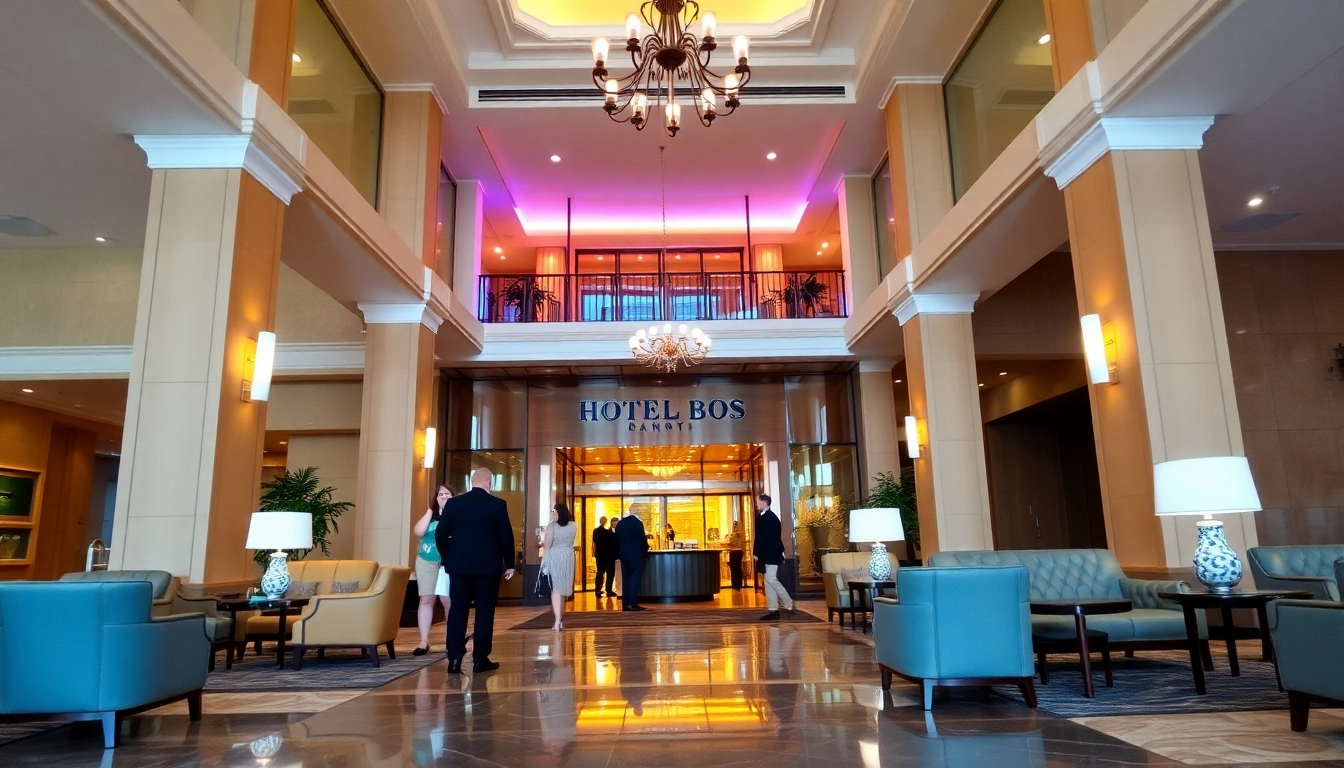
Understanding Hotel Management
Definition of Hotel Management
Hotel management encompasses the entire operation and administration of a hotel establishment. It involves overseeing various departments such as front office operations, housekeeping, food and beverage services, and guest relations, all while ensuring that the hotel is profitable, efficient, and meets the expectations of its guests. As a crucial segment of the hospitality industry, hotel management entails not just the management of day-to-day operations but also strategic planning for long-term success.
In essence, hotel management involves mastering a diverse array of skills, from financial management to customer service, aiming to provide a memorable experience for every guest while maximizing an establishment’s financial performance.
Key Responsibilities of Hotel Managers
Hotel managers play a pivotal role in ensuring the seamless operation of their establishments. Key responsibilities include:
- Operational Management: Supervising day-to-day operations across all hotel departments to maintain efficient service delivery.
- Financial Oversight: Monitoring budgets, revenues, and expenses to ensure profitability, including overseeing financial reports and forecasts.
- Guest Services: Addressing guest needs and feedback to enhance customer satisfaction, which is vital to repeat business and brand loyalty.
- Staff Management: Recruiting, training, and managing staff to uphold service quality and handle team dynamics effectively.
- Sales and Marketing: Developing marketing strategies to promote the hotel and attract potential guests through various channels.
The Role of Technology in Hotel Management
In recent years, technology has revolutionized the hospitality industry, shifting how hotels operate and interact with guests. Essential technology solutions include:
- Property Management Systems (PMS): These systems allow managers to handle reservations, check-ins, billing, and other essential tasks efficiently.
- Customer Relationship Management (CRM): Tools that help in managing guest interactions and personalizing services based on customer data.
- Revenue Management Systems: Software that assists in pricing strategies to maximize revenue by analyzing demand forecasts and market conditions.
- Online Booking Platforms: Websites and applications that facilitate direct bookings and increase visibility in a competitive market.
Essential Skills for Successful Hotel Management
Leadership and Team Management
Effective leadership is at the heart of successful hotel management. Hotel managers must inspire and motivate their teams, delegating responsibilities appropriately to foster an empowered workforce. Key skills include:
- Vision and Strategy: Developing a clear vision and strategic plan for the hotel’s growth and performance.
- Motivational Skills: Creating a positive work environment that encourages employee engagement and high performance.
- Conflict Resolution: Addressing interpersonal conflicts proactively to maintain harmony within the team.
Financial and Budget Management in Hotels
A profound understanding of financial principles is critical in hotel management. Responsibilities in this area typically include:
- Budgeting: Establishing and adhering to budgets for various departments, managing costs without compromising service quality.
- Financial Analysis: Evaluating financial reports to identify trends, discrepancies, and opportunities for cost savings.
- Profitability Management: Implementing strategies to enhance revenue streams while minimizing wastage and inefficiencies.
Effective Communication Strategies
Communication is vital in hotel management as it involves interacting with staff, guests, and stakeholders. Effective strategies include:
- Active Listening: Ensuring all parties feel heard and valued, from guests voicing concerns to staff discussions.
- Clear Messaging: Articulating information without ambiguity to prevent misunderstandings and operational hiccups.
- Transparency: Cultivating open communication regarding management decisions and changes within the establishment, fostering trust at all levels.
Challenges in Hotel Management and How to Overcome Them
Common Operational Challenges
Operational challenges in hotel management can significantly impact service delivery and guest satisfaction. These challenges may include:
- Staff Turnover: High turnover rates can disrupt operations. Solutions include improving work culture, offering competitive salaries, and implementing professional development programs.
- Seasonality: Many hotels face fluctuations in occupancy rates depending on the season. Strategies such as offering seasonal promotions and diversifying target markets can help mitigate this.
- Guest Expectations: Meeting ever-rising guest expectations necessitates continuous staff training and service enhancements to ensure memorable experiences.
Guest Relations: Handling Complaints and Feedback
Handling guest complaints effectively is crucial for maintaining a hotel’s reputation. Best practices include:
- Prompt Response: Address complaints quickly to show that the hotel values guest feedback and is committed to service improvement.
- Empathy and Understanding: Demonstrating genuine concern for issues raised helps to ensure that guests feel appreciated and heard.
- Follow-up: After resolving an issue, contacting the guest ensures they were satisfied with the outcome and illustrates a commitment to quality service.
Staying Competitive in a Saturated Market
The hotel industry is highly competitive. To stay ahead, hotels must differentiate themselves through:
- Unique Offerings: Developing niche markets or specialty services that align with target demographics enhances appeal.
- Branding and Positioning: Creating a strong brand identity helps attract and retain guests. This involves storytelling that resonates with potential customers.
- Sustainability Practices: Implementing environmentally friendly practices not only improves reputation but has become a key factor for many modern travelers when choosing accommodations.
Exploring Career Opportunities in Hotel Management
Qualifications Required for Hotel Management Roles
To pursue a career in hotel management, individuals typically require a combination of education and experience:
- Educational Background: Most positions require at least a bachelor’s degree in hospitality management, business administration, or a related field.
- Work Experience: Practical experience, often gained through internships or entry-level positions in hotels, is invaluable.
- Certifications: Professional certifications, such as Certified Hospitality Administrator (CHA) or Hotel Industry Professional (HIP), can enhance employability and career prospects.
Potential Career Paths and Growth Areas
Career trajectories in hotel management can vary widely, offering multiple paths for growth, including:
- General Manager: Oversees hotel operations and strategy, usually the pinnacle of a hotel management career.
- Director of Sales and Marketing: Focuses on market positioning and promotion of the hotel.
- Front Office Manager: Responsible for managing front desk operations and guest services.
- Operations Manager: Ensures efficient operations across all hotel departments.
Discussing Salary Expectations in Hotel Management
Salary ranges in hotel management can vary based on factors such as location, hotel size, and individual experience. Starting salaries for entry-level positions often begin at around $35,000 to $45,000 annually, while seasoned hotel managers and general managers can earn between $60,000 to over $200,000 per year. Performance bonuses and profit-sharing opportunities can further enhance earnings.
The Future of Hotel Management
Trends Shaping the Hotel Industry
The hotel industry is undergoing significant transformations influenced by developments in technology, changing consumer preferences, and global economic shifts. Significant trends include:
- Personalization: Guests expect tailored experiences, prompting hotels to use data analytics to fine-tune services and enhance satisfaction.
- Health and Safety Protocols: Post-pandemic, the hospitality industry has embraced rigorous cleaning standards and health policies to build guest trust.
- Remote Work Accommodations: With the rise of remote work, hotels are repurposing offerings, such as day-use rates for professionals seeking a productive environment.
How Sustainability is Influencing Hotel Management
Sustainability has become a critical focus for the hospitality industry. Practices that reduce environmental impact include:
- Energy Efficiency: Implementing energy-saving measures such as LED lighting, smart thermostats, and geothermal heating systems.
- Waste Reduction: Initiatives to minimize waste, such as composting, recycling programs, and eliminating single-use plastics.
- Community Involvement: Supporting local businesses and sourcing food locally fosters community ties and enhances guests’ experiences.
Preparing for Future Challenges in Hospitality Management
The future of hotel management presents various challenges, including economic fluctuations and evolving guest expectations. To prepare:
- Continuous Learning: Hotel managers must stay updated about the latest trends and best practices through workshops and industry conferences.
- Adopting Technology: Regularly evaluating and integrating innovative technology solutions ensures competitiveness in a rapidly evolving marketplace.
- Adapting Strategies: Flexibility in management strategies is necessary to pivot effectively in response to market changes.







